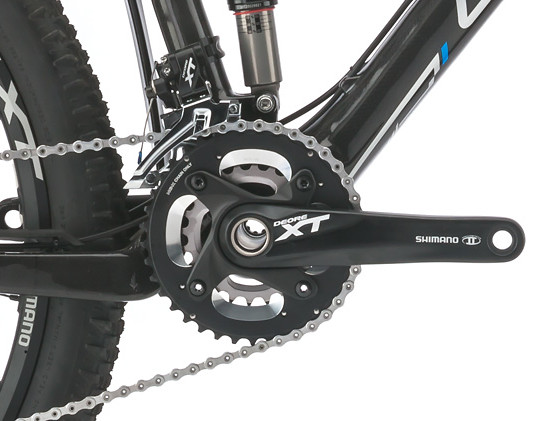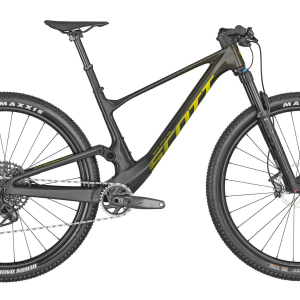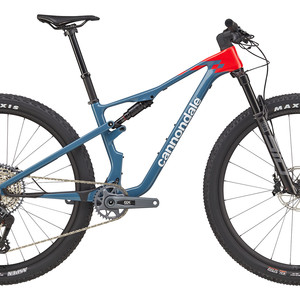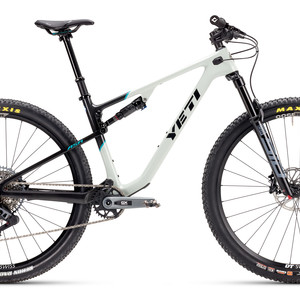2013 Felt Virtue 1
(discontinued)
| Where To Buy | |||
|---|---|---|---|
Free U.S. shipping on orders over $45.
International shipping available. Some exclusions apply. |
|||
Free shipping on orders over $50 (continental U.S. only).
International shipping available. Some exclusions apply. |
|||
Free shipping on orders over $50 (continental U.S. only).
International shipping available. Some exclusions apply. |
|||
Reviewed by Matt Thompson and Jess Pedersen // Written by Brandon Turman // Photos by Shawn Spomer and Brandon Turman
First introduced in 2006, the Felt Virtue series has grown with the times, technologies, and preferences of riders. While the model names, angles, and frame materials have varied over the years, Felt's Equilink suspension platform has remained constant, proving its value and function. Now in its seventh year of production, the 2013 Virtue 1 features up to 130mm of travel, a full UHC Performance Carbon frame, and retains the geometry numbers found on the 2012 lineup. After a positive experience on the Felt Compulsion, the Virtue's big brother, we were interested to see how the Virtue 1 would hold up to some abuse during our 2013 Test Sessions in Southern Utah.

Virtue 1 Highlights
- Full UHC Performance carbon frame
- 26-inch wheels
- 120 or 130mm (4.72 or 5.11-inches) adjustable rear wheel travel
- Tapered head tube
- 69-degree head angle
- 73.5-degree seat angle
- 10mm bottom bracket rise
- 425mm (16.7-inch) chainstay length
- Standard 73mm thread in bottom bracket
- 135mm QR rear axle
- Measured weight (size Large): 28-pounds 3-ounces (12.8kg)
- MSRP $6,199
Back in 2012, the Virtue lineup was redesigned to improve stiffness and update the frame to current standards. Geometry also received a few tweaks, making the bike a touch slacker and more stable than before. Weight has varied over the years, and with the addition of a dropper post the 2013 Virtue 1 took a slight hit in this department, but it's a very welcome addition.
The 2013 Virtue 1 frame is made from Felt's UHC Performance Carbon, which is "a T700-based blend of raw carbon fiber with a tensile strength that’s 7.9 times greater than 3/2/5 titanium and a stiffness rating that’s 3.34 times greater than 6061 aluminum." Sounds impressive, right?
The construction technique for the Virtue follows their own "DMC" (Dynamic Monocoque Construction) process, which essentially means they mold individual sections of a frameset and then join them together with a co-molding process. "This allows each frame section to be further optimized for its intended purpose while keeping maximum ride quality and performance as a priority," according to Felt. Vibration absorption, durability, and stiffness are among the factors considered for each segment, and seams are avoided in critical areas. The downtube and driveside chainstay are both protected by rubberized guards to prevent damage and keep the frame looking sharp over time.
Cable routing is done well, with a mixture of internal and external paths, most of which follow the downtube. The dropper post cable guides do look a bit DIY compared to the rest of the package, but they get the job done well.

Out back, suspension duties are handled using Felt's Equilink system. Not to be confused with a four-bar linkage suspension design, the Stephenson-style six-bar linkage system is said to disconnect drivetrain forces from bump absorption forces. When pedaling, the force from chain tension attempts to pull the lower link downward while the upper link attempts to pivots upward. Because the two links are connected by the Equilink (the vertical bar near the seat tube) in precisely calculated positions, the opposing forces effectively cancel each other out, "equalizing" the system. Ultimately this means the suspension is unaffected and able to absorb impacts while pedaling.
The Equilink system can be tuned depending on the bike's intended application, and in the case of the Virtue, the progressive leverage curve is certainly geared toward efficiency. A combination of sealed cartridge bearings in the main pivots and DU bushings in the Equilink allow the rear end to function quite smoothly, the latter of which are intended to save weight and increase longevity of the system due to their element-prone locations.
The rear shock is very accessible, making compression and rebound knobs easy to get to if desired when the terrain changes. There is also a travel adjust option at the upper shock mount, allowing you to change between 120 and 130mm of travel without affecting the geometry much, if at all. Though we appreciate the option to customize the bike, the 10mm difference wouldn't likely be very noticeable on the trail, so we kept it in 130mm mode and let 'er rip for our Test Sessions.
On The Trail
Trails for this test were on two extremes, just to get a feel for the ride in various conditions. Matt piloted the Virtue down the loose, rocky, rowdy, and sometimes hair-raising Grafton Mesa trail for a few laps. Jess choose the smoother Guacamole network of trails, which is a never-ending maze of short ups, downs, and g-outs on Slickrock-esque terrain.
Reaching out and grabbing the 700mm Felt-branded bars, the Virtue felt balanced and centered with a roomy cockpit. While the top tube was of a good length, the 90mm stem did put us a little further over the front end than we'd prefer for descents, causing the bike to be a little less stable. Though this was the case, it was very manageable and put us in a great position for extended climbs.
Another factor that contributed to the over the front feel was the rather steep 69-degree head angle. For a bike in the 130mm travel range and the terrain we love to ride, we'd prefer it to be about two degrees slacker. Yeah, we're suckers for slack bikes, but that's only because we're also suckers for fun descents. Most of Felt's lineup has a cross-country appeal, and we can see why. They're made to get up the hills, corner, and sprint very well. That said, the bike could still be pushed when we wanted to. We just needed to be on our A-game, requiring a little more confidence, skill, and an aggressive riding style to keep things in check than most other trail bikes required.

We will put a qualifier on that statement though - this bike wasn't inspiring in steep, gnarly conditions, and the average rider may get overwhelmed when things get really rough. Casually riding on the descents may also get you into trouble. It performed admirably in normal downhill trail conditions though, and was precise, responsive, snappy, turned quite well, and exhibited the ability to change lines easily. It was even playful when things weren't steep, but with that 90mm stem in place it required a good yank to get the front end off the ground.
Speaking of the front end, we noticed a surprising amount of flex in the cockpit while descending. Consider swapping the setup for something a bit more robust if you're a heavy or aggressive rider. Flex wasn't an issue anywhere else, though, in the frame or otherwise, even with the quick-release rear axle.
The Virtue's suspension felt supported and balanced, performed really well over small bumps and chatter, and took high-speed, squared off hits well enough within its range of travel. When the high-speed compressions got bigger, or g-outs and drops were hit, the suspension seemed to blow through the travel easier than it should have, and we think that the rear shock was a bit outmatched for our level of aggressiveness. It didn't overheat or fade, it just couldn't respond to the roughness of the trails that we like to ride. While the bike maintains a nice progressive leverage curve throughout the entire range of travel, we're of the opinion that a bike in the $6,200 price range should be spec'd with a higher performing shock than the RockShox Monarch RT3 - perhaps a Monarch Plus or equivalent.

At 28.2-pounds, the Virtue 1 is right in line with bikes near the same price point, and it feels like a trail bike should - not heavy and not too light for general shredding. It rolled really fast, which only added to the bike's expertise on the way up.
Out of the saddle efforts were responded to immediately, and the bike snapped-to when sprinting. It accelerated quickly and felt supported under power, though this was another instance where the bar/stem flex was noticeable.
With the forward body position and geometry geared more for cross-country, the bike was a very efficient climber. The Equilink suspension system works as advertised, creating a bike that pedals very well independent of the suspension setup. Pedal bob was almost non-existent in either chainring, allowing us to leave the shock wide open most of the time. It felt light and nimble, enabling the pilot to execute tech moves while maintaining traction. The non-cramped body position was also very nice for sustained climbs. At 73.5-degrees, though, the seat angle is certainly suited to steep ups, and we sometimes felt a little too far over the bottom bracket on the flats and pedally downhill sections, especially for a bike with 130mm of travel.
Build Kit
Components on the Virtue 1 are a nice mix of Felt branded bits to help keep the price manageable, RockShox suspension, a Crankbrothers seatpost, WTB tires, and a good amount of Shimano XT parts.

Aside from the flex in the stem/bar are area, we were quite pleased with Felt's in house components. The grips were thin and comfortable, as was the saddle, and the seat clamp did its job just fine.
Up front, the RockShox Revelation RCT3 Solo Air 15 fork provided 130mm of smooth travel to match the rear end, and was plenty stiff and adjustable.
WTB's Wolverine TCS 2.2-inch tires rolled like a dream, but were quite drifty in loose conditions. They did very well on hard pack and rock, though. A little more volume up front would also be appreciated on steep descents.
The Crankbrothers Kronolog worked okay on this build, providing a large range of saddle height adjustment at the push of a button, but we've had some long term issues with it in the past.
That brings us to the large list of Shimano XT components, all of which performed flawlessly and helped boost our perception of the bik. The XT Trail wheelset was plenty stiff, easy to go tubeless, and the rear hub had a nice purr when coasting at speed. Shimano's XT brakes were once again a highlight, providing plenty of usable power, modulation, and a great lever feel without any fade on long descents. The XT drivetrain also shifted perfectly, front and rear, while keeping noise to a minimum and making the ride more enjoyable because of it.
Long Term Durability
As a word of caution, be sure to put a dab of LockTite on each of the pivot bolts prior to hitting the trail for the first time. While Felt has improved things in this area over the years, some of them still have the tendency to loosen and we'd suggest this simple precautionary measure.
A rather loud, deep creek from the bottom bracket area when starting from standstill was a little disconcerting, as it sounded as if something were cracking. We weren't able to find evidence of any damage though, and there was no noticeable flex in the frame. It may have just been a case of needing to re-grease or tape the bottom bracket threads.
Other than those two, plus the seat post, the bike presented no long term concerns during our time bashing on it in rocky Southern Utah.

What's The Bottom Line?
The Felt Virtue 1 is a bike built to put down a lot of miles quickly. It feels light, rolls fast, climbs exceptionally well, and is great for intermediate descending. As the trail gets steeper and more technical, though, things get a little twitchy, requiring more out of the rider. That said, it's certainly geared toward the cross-country side of things, in terms of both efficiency and geometry. The Virtue 1 is best suited for the trail rider who's not looking to tackle any majorly rough terrain, but who lives for the thrill of cruising smoother singletrack and carving good turns. If you're the type whose riding style includes blasting descents and an aggressive mindset, this may not be the ideal bike for you.
For more info on the Virtue series, jet over to www.feltbicycles.com.
Bonus Gallery: 31 photos of the 2013 Felt Virtue 1
About The Reviewers
Matt Thompson - Humble enough not to claim his Master's Downhill World Champ status when we asked him what his accomplishments were, Matt has over 20 years on a bike and likes to go fast. Really fast. At 210 pounds of trail building muscle, he can put the hurt on a bike in little to no time.
Jess Pedersen - Jess is one of those guys that can hop on a bike after a snowy winter and instantly kill it. He's deceptively quick, smooth, and always has good style. He's also known to tinker with bikes 'til they're perfect, creating custom additions and fixes along the way. Maybe it's that engineering background...
Specifications
| Where To Buy | |||
|---|---|---|---|
Free U.S. shipping on orders over $45.
International shipping available. Some exclusions apply. |
|||
Free shipping on orders over $50 (continental U.S. only).
International shipping available. Some exclusions apply. |
|||
Free shipping on orders over $50 (continental U.S. only).
International shipping available. Some exclusions apply. |
|||





















































3 comments
Post a reply to: 2013 Test Sessions: Felt Virtue 1